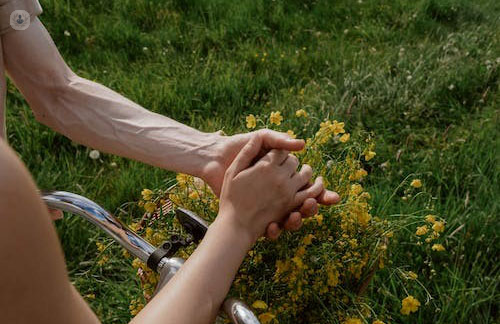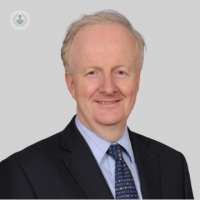Varicose veins: All you need to know
Written in association with:In his latest online article, Professor Alan Davies gives us his insight into varicose veins. He explains why they occur, what we can do at home to stop them progressing, what exercise is best and treatment.

Why do varicose veins occur?
The straightforward answer is that we don't really know why varicose veins occur. But there are several factors that could increase your chances of getting them. For example, if your parents have had varicose veins, if you're carrying extra weight, if you're a woman, if you've been through pregnancy, or if you smoke – all of these things are linked to the likelihood of developing varicose veins. There are also other everyday things around you that can make it more likely to have them, like having a job where you have to stand a lot.
Why are varicose veins more painful at the end of the day?
People with varicose veins might feel pain right over the veins or experience itching and aching towards the end of the day. Swelling usually increases, and the pain can get worse during this time. This happens because of something called venous hypertension that develops in the leg and foot. This is because the blood doesn't flow out of the leg and foot properly, so pressure builds up. This pressure triggers pain in the leg. The pain tends to get worse when the legs are a bit more swollen, like after standing for a long time.
What can you do at home to stop varicose veins progressing?
At home, there are a few things you can do. Avoid standing still for long periods – try walking around and moving your calf muscles to help blood flow back to your heart. When watching TV or something similar, try raising your legs to the same level as your heart. These actions can ease symptoms, but they won't stop varicose veins from forming. Also, it's important to know that there's no clear evidence that wearing compression stockings actually prevents varicose veins. If you already have varicose veins, it's best to get checked by a clinician to figure out the right treatment for you.
Can varicose veins be cured by exercise? Which type is best?
Exercise can't fix varicose veins. Some of the symptoms that exercising can cause might be reduced by using the calf muscle pump technique. Interestingly, when we looked into varicose vein guidance, we found some proof that people who do really intense exercise are more likely to get varicose veins and have problems with them. So, it's important to be mindful of how much exercise you're doing. The best exercise for varicose veins is simply walking.
What is the best way to sleep or rest if you have varicose veins?
The important factor here is that if you're experiencing the different symptoms in your leg, the solution is quite clear – you should elevate your legs. You might find it comfortable to place a pillow under them or, if you're watching TV, raise your legs using a sofa or some cushions. However, the primary goal is to have your legs raised, which helps encourage the blood's return to the heart.
How has the treatment of varicose veins progressed in recent years?
The way varicose veins are treated has changed a lot in the past 10 to 15 years. Before, people had surgery with general anaesthesia, but now patients can get treatment with local anaesthesia. This can involve things like using laser or radiofrequency to close off the vein, or using glue or chemicals. For smaller veins closer to the skin, they can be treated by injecting or removing them while you're numbed in that area. These changes in treatment are all described in the NICE guidance.
You can get treated as an outpatient. The main idea is that if your varicose veins are causing significant symptoms, you shouldn't be told to wear compression stockings and manage on your own. NICE and other groups that deal with vein issues recommend you see a doctor and get offered treatment for your problem veins instead of just using compression.
NICE has given clear suggestions on when to get medical help. If you're having symptoms in your leg like pain, swelling, a history of vein inflammation, past leg sores, new leg sores, or skin changes in the leg, your GP should send you to a specialist to get checked. So, if you have veins causing problems, it's a good idea to see a doctor. But if you have varicose veins that aren't bothering you or tiny thread veins, these are more about looks. You can choose whether to get them removed, but it's not medically necessary. People sometimes remove them for cosmetic reasons.
Professor Alan Davies is a highly regarded vascular surgeon with over 25 years of experience. You can schedule an appointment with Professor Davies on his Top Doctors profile.


